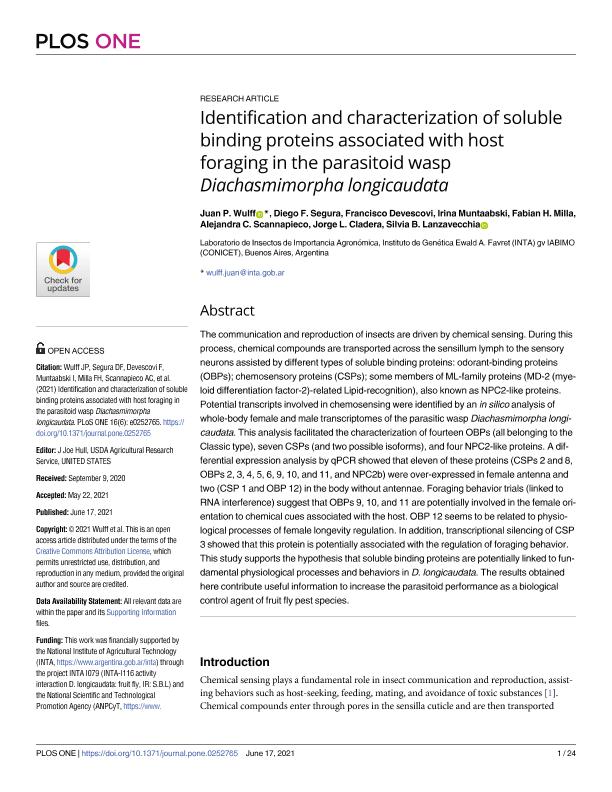Artículo
Identification and characterization of soluble binding proteins associated with host foraging in the parasitoid wasp Diachasmimorpha longicaudata
Wulff, Juan Pedro ; Segura, Diego Fernando
; Segura, Diego Fernando ; Devescovi, Francisco
; Devescovi, Francisco ; Muntaabski, Irina
; Muntaabski, Irina ; Milla, Fabian Horacio; Scannapieco, Alejandra Carla
; Milla, Fabian Horacio; Scannapieco, Alejandra Carla ; Cladera, Jorge Luis; Lanzavecchia, Silvia Beatriz
; Cladera, Jorge Luis; Lanzavecchia, Silvia Beatriz
 ; Segura, Diego Fernando
; Segura, Diego Fernando ; Devescovi, Francisco
; Devescovi, Francisco ; Muntaabski, Irina
; Muntaabski, Irina ; Milla, Fabian Horacio; Scannapieco, Alejandra Carla
; Milla, Fabian Horacio; Scannapieco, Alejandra Carla ; Cladera, Jorge Luis; Lanzavecchia, Silvia Beatriz
; Cladera, Jorge Luis; Lanzavecchia, Silvia Beatriz
Fecha de publicación:
06/2021
Editorial:
Public Library of Science
Revista:
Plos One
ISSN:
1932-6203
Idioma:
Inglés
Tipo de recurso:
Artículo publicado
Clasificación temática:
Resumen
The communication and reproduction of insects are driven by chemical sensing. During this process, chemical compounds are transported across the sensillum lymph to the sensory neurons assisted by different types of soluble binding proteins: odorant-binding proteins (OBPs); chemosensory proteins (CSPs); some members of ML-family proteins (MD-2 (myeloid differentiation factor-2)-related Lipid-recognition), also known as NPC2-like proteins. Potential transcripts involved in chemosensing were identified by an in silico analysis of whole-body female and male transcriptomes of the parasitic wasp Diachasmimorpha longicaudata. This analysis facilitated the characterization of fourteen OBPs (all belonging to the Classic type), seven CSPs (and two possible isoforms), and four NPC2-like proteins. A differential expression analysis by qPCR showed that eleven of these proteins (CSPs 2 and 8, OBPs 2, 3, 4, 5, 6, 9, 10, and 11, and NPC2b) were over-expressed in female antenna and two (CSP 1 and OBP 12) in the body without antennae. Foraging behavior trials (linked to RNA interference) suggest that OBPs 9, 10, and 11 are potentially involved in the female orientation to chemical cues associated with the host. OBP 12 seems to be related to physiological processes of female longevity regulation. In addition, transcriptional silencing of CSP 3 showed that this protein is potentially associated with the regulation of foraging behavior. This study supports the hypothesis that soluble binding proteins are potentially linked to fundamental physiological processes and behaviors in D. longicaudata. The results obtained here contribute useful information to increase the parasitoid performance as a biological control agent of fruit fly pest species.
Archivos asociados
Licencia
Identificadores
Colecciones
Articulos (IABIMO)
Articulos de INSTITUTO DE AGROBIOTECNOLOGIA Y BIOLOGIA MOLECULAR
Articulos de INSTITUTO DE AGROBIOTECNOLOGIA Y BIOLOGIA MOLECULAR
Citación
Wulff, Juan Pedro; Segura, Diego Fernando; Devescovi, Francisco; Muntaabski, Irina; Milla, Fabian Horacio; et al.; Identification and characterization of soluble binding proteins associated with host foraging in the parasitoid wasp Diachasmimorpha longicaudata; Public Library of Science; Plos One; 16; 6; 6-2021; 1-24
Compartir
Altmétricas



